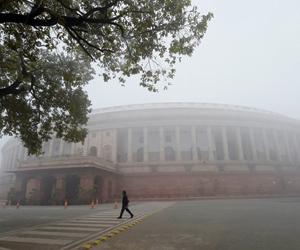Women got the vote in India in the Constitution, and, still we are at 11.8 per cent for women in elected bodies, less than our neighbours


Asia has always had more women leaders than the western world and before the western world. File pic
ADVERTISEMENT
 According to the website, India Spend, the global average for women Parliamentarians is 28.5 per cent. India stands at 11.8 per cent, less than its neighbours Nepal, Bangladesh and Pakistan.
According to the website, India Spend, the global average for women Parliamentarians is 28.5 per cent. India stands at 11.8 per cent, less than its neighbours Nepal, Bangladesh and Pakistan.
As we approach another International Women's Day, all sorts of figures will be pushed out about how well (because we must have hope and be positive no matter what the evidence says) plus also how badly (because reality usually pushes through happy hooey no matter how strong the drugs you're taking are) women are doing in the world.
What the #MeToo movement has proved, in spite of all the flak it has received mainly from Catherine Deneuve, is that women, no matter how powerful they may appear, can very easily be subjugated and diminished. As American talk show host Jimmy Kimmel put it at the Oscars, women have fought against sexual harassment in the film and television industry only to continue to be harassed everywhere else in their lives.
And, that is the stark truth of the matter. A woman is killed by her parents in India because she fell in love with a man they didn't approve of. Lower caste, if you want the full technicolour story of discrimination, prejudice and domination. They watched her die, writhing in agony from the poison they gave her.
Another woman in India is told by the courts that she cannot marry the man she married because her father felt that the man was the wrong man. Wrong religion, too, as far as the father is concerned, because as we see every day, why not add prejudice to the equation wherever you can. It has taken the Supreme Court of India to reassure us that we, as adults, are free to marry whoever we want. At the same time, in some parts of India, we see children married off by their parents even though it has been against the law for decades. Tradition, another side of discrimination and domination sometimes, must win, you see.
The argument that more women in politics will help is an old one and an understandable one. With women in power, discrimination against women will reduce goes the logic. Asia has always had more women leaders than the western world and before the western world. And, yet, many of these women have just followed old patriarchal methods of ruling. The battle is against patriarchal mindsets and the traditions, which give currency to male domination and "wisdom". For that, we need all people to be involved, not just by gender identity and identification.
And, yet, it is possible that just by having more women in legislative bodies, eventually the female perspective will get more currency. Women got the vote in India in the Constitution. And, still we are at 11.8 per cent for women in elected bodies. All the lip service about "empowerment" apart, no political party has taken the Women's Representatives Act seriously. And, that just asks for 33 per cent for 50 per cent of the population.
Let's not be all doom and gloom. The women of Hollywood have at least started a conversation about what happens behind closed doors with powerful men and this conversation has created ripples around the world. A few men have been made examples of. Some people, including women, have tried to trivialise the protests by coming up with some absurd comments about the end of a happy concourse between men and women. It takes a special kind of a mind to confuse rape and flirtation.
It is best therefore not to get distracted by women steeped in patriarchy. The past decade in India has seen women rising in a variety of ways. From reclaiming public spaces to challenging shibboleths to pushing back. Not all of these methods or causes may please all of us, but the end result is the same: it means that women have a voice and that voice wants to be heard. It wants more than soothing "there there's" because these women are not children and they are not pets (though they also have rights).
International Women's Day is in many ways just tokenism. It started with good intentions and strong intent. But, given how little has changed, it seems almost passe. If the symbolism is empty, let the protests and the demands get stronger at least. How difficult is the battle from 11.8 per cent to 50 per cent, do you think?
Ranjona Banerji is a senior journalist. You can follow her on Twitter @ranjona Send your feedback to mailbag@mid-day.com
Catch up on all the latest Mumbai news, crime news, current affairs, and also a complete guide on Mumbai from food to things to do and events across the city here. Also download the new mid-day Android and iOS apps to get latest updates
 Subscribe today by clicking the link and stay updated with the latest news!" Click here!
Subscribe today by clicking the link and stay updated with the latest news!" Click here!






